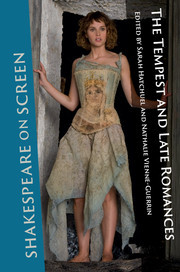Description
Shakespeare on Screen
The Tempest and Late Romances
Shakespeare on Screen Series
Coordinators: Hatchuel Sarah, Vienne-Guerrin Nathalie
This volume provides up-to-date coverage of recent screen versions of Shakespeare's plays, as well as critical reviews of older canonical films.
Language: English
Publication date: 04-2017
330 p. · 15.7x23.5 cm · Hardback
330 p. · 15.7x23.5 cm · Hardback
Description
/li>Contents
/li>Biography
/li>
The second volume in the re-launched series Shakespeare on Screen is devoted to The Tempest and Shakespeare's late romances, offering up-to-date coverage of recent screen versions as well as new critical reviews of older, canonical films. An international cast of authors explores not only productions from the USA and the UK, but also translations, adaptations and appropriations from Poland, Italy and France. Spanning a wide chronological range, from the first cinematic interpretation of Cymbeline in 1913 to The Royal Ballet's live broadcast of The Winter's Tale in 2014, the volume provides an extensive treatment of the plays' resonance for contemporary audiences. Supported by a film-bibliography, numerous illustrations and free online resources, the book will be an invaluable resource for students, scholars and teachers of film studies and Shakespeare studies.
1. Introduction: 'What have we here?': acknowledging Shakespeare's romances on screen Sarah Hatchuel and Nathalie Vienne-Guerrin; 2. Thanhouser's fierce abridgement of Cymbeline Lindsay Ann Reid; 3. Looking (at) women in the BBC Pericles Edel Semple; 4. Scenes from Cymbeline and early television studio drama John Wyver; 5. Romance for television: the BBC Cymbeline Robert S. White; 6. The Winter's Tale: comparing the Polish Television Theatre and the BBC versions Jacek Fabiszak; 7. The Winter's Tale's spectral endings: death, dance and doubling Judith Buchanan; 8. Shakespeare's puppets: The Tempest and The Winter's Tale in the Animated Tales Maddalena Pennacchia; 9. 'Something rich and strange': Jarman's defamiliarisation of The Tempest Peter J. Smith; 10. The absent masque in three films of The Tempest Russell Jackson; 11. Prospero's Books: hyperreality and the Western imagination Randy Laist; 12. The alternating utopic revisions of The Tempest on film Delilah Bermudez Brataas; 13. Screen magic in Greenaway's Prospero's Books and Taymor's The Tempest Victoria Bladen; 14. Almereyda's Cymbeline: the end of teen Shakespeare Douglas M. Lanier; 15. Ghost towns and alien planets: variations on Prospero's island Kinga Földváry; 16. Grafting The Tempest onto Allégret's Le Bal du Comte d'Orgel Gaëlle Ginestet; 17. The romances on screen: select film-bibliography José Ramón Díaz Fernández; Index.
Sarah Hatchuel is Professor of English Literature and Film and Head of the Groupe de Recherche Identités et Cultures (GRIC) at the University of Le Havre, as well as President of the Société Française Shakespeare. She has written extensively on adaptations of Shakespeare's plays, including Shakespeare and the Cleopatra/Caesar Intertext: Sequel, Conflation, Remake (2011), Shakespeare, from Stage to Screen (Cambridge, 2004), and A Companion to the Shakespearean Films of Kenneth Branagh (2000), and has also written on television series, including Lost: Fiction vitale (2013) and Rêves et séries américaines: la fabrique d'autres mondes (2015). She is Co-editor-in-chief of the online journal TV/Series.
Nathalie Vienne-Guerrin is Professor in Shakespeare studies at Université Paul Valéry, Montpellier and Director of the Institut de Recherche sur la Renaissance, l'âge Classique et les Lumières. She is co-editor-in-chief of the international journal Cahiers Élisabéthains and Co-director (with Patricia Dorval) of the Shakespeare on Screen in Francophonia Database (shakscreen.org). She has published The Unruly Tongue in Early Modern England, Three Treatises (2012) and is the author of Shakespeare's Insults: A Pragmatic Dictionary (2016). She is Co-editor of the online journal Arrêt sur Scène/Scene Focus.
Nathalie Vienne-Guerrin is Professor in Shakespeare studies at Université Paul Valéry, Montpellier and Director of the Institut de Recherche sur la Renaissance, l'âge Classique et les Lumières. She is co-editor-in-chief of the international journal Cahiers Élisabéthains and Co-director (with Patricia Dorval) of the Shakespeare on Screen in Francophonia Database (shakscreen.org). She has published The Unruly Tongue in Early Modern England, Three Treatises (2012) and is the author of Shakespeare's Insults: A Pragmatic Dictionary (2016). She is Co-editor of the online journal Arrêt sur Scène/Scene Focus.
© 2024 LAVOISIER S.A.S.
These books may interest you

Shakespeare on Screen: Othello 106.56 €

Shakespeare on Screen: Othello 30.28 €

Shakespeare on Screen: King Lear 107.80 €


